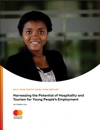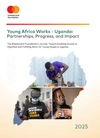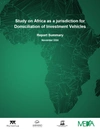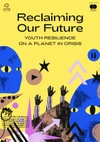2017-2018 Youth Think Tank Report
In an era where youth unemployment in Africa is an undeniable challenge, leaders and policymakers must focus their efforts on supporting growth sectors. As a sector that created over nine million jobs in 2017 and is expected to create over 12 million jobs in 2028, tourism and hospitality has a unique potential to create jobs for youth in Africa. With its high multiplier effect, this sector will create millions of additional jobs in other sectors like agriculture, logistics, ICT, and banking.
Some key facts about the travel and hospitality industry in Africa:
- The total contribution of tourism to GDP is more than US$177 billion in 2017 and is expected to grow by 4.2 percent per year to US$278 billion in 2028, 8.1 percent of the GDP.
- In the past two decades, tourism export revenues in Africa have risen three-fold.
- Tourism attracted more than US$28.2 billion in investment to the continent in 2017.
While data on the prospects of tourism and hospitality is widely available, there is missing data on young people’s perspectives of the sector, which can hinder the ability of decision-makers to develop sound, youth-friendly programs and policies.
So what do young people think about hospitality and tourism jobs?
In the new research from the Youth Think Tank, titled Harnessing the Potential of Hospitality and Tourism for Young People’s Employment,
14 young researchers — from Ghana, Kenya, Malawi, Rwanda, Tanzania, Uganda, and Zambia — share their insights after conducting 30 focus groups, as well as interviews with over
350 young people and 19 employers in this sector.
The Youth Think Tank is a partnership between the Mastercard Foundation and Restless Development which seeks to elevate youth voices. They do this by engaging researchers across Africa who build youth-led evidence across various sectors. Through a unique methodology, young researchers on this particular project sought to answer the following questions related to the hospitality and tourism sector:
- What factors affect how young people perceive opportunities?
- What skills do young people need to be successful?
- What actions should training institutions, policymakers, and private sectors take to improve employment opportunities for young people?
The findings showed mixed opinions on how young people perceive those who work in tourism and hospitality jobs. While young people’s perceptions are influenced by the negative opinions of their peers, their parents, and of the communities around them, the research also indicated that their perception of the sector changed with an increased awareness of how jobs in hospitality and tourism are paying off and are “not so different from jobs in other sectors.” This shows that tackling negative sector perceptions held by young people and community members can be done by profiling a range of young people — particularly young women — who are succeeding and growing in the sector.
Both young people and employers feel the burden of the skills mismatch. The research shows that 87 percent of youth working in the sector have received on-the-job training from their employers, as training institutions are not delivering the required skills. The gap many described is in the ability of formal training programs to provide practical exposure.
In addition to practical experience, both employers and young employees identified soft-skills as an important component for the job, and unfortunately, one that is particularly lacking. Across all steps of career growth — at hiring, in retaining their positions, and in attaining promotions — young people and their employers identify the same key qualities that contribute to a young person’s success in this sector: positive attitude, work ethic, flexibility, interpersonal skills, and integrity.
Youth Voices and the Young Africa Works Strategy
While many countries in Africa have developed and implemented tourism policies linked to national development plans, what is missing is the consideration of youth-led evidence and perspectives to develop, implement, and monitor the success of these policies. At the Mastercard Foundation, we believe youth engagement could be a game-changer in the process of addressing key issues hindering sector growth, particularly those related to workforce development.
The findings of this report will continue to inform our programs as we implement our new strategy Young Africa Works. In fact, some of the recommendations of this report have already been incorporated in our new initiative Hanga Ahazaza, in which young people were engaged in the design of the program. It is a US$50 million, five-year initiative focused on increasing employment opportunities for young people by providing them with demand-led skills while expanding the tourism and hospitality sector in Rwanda. The name, Hanga Ahazaza meaning “create the future,” came from young people — as a result of their vision for a program that will bring a bright future to many young Rwandans.
A Call to Action
Developing youth-led evidence and incorporating young people in policy development and decision-making are just first steps. For meaningful engagement, they must have clear roles and responsibilities. This means in addition to developing youth capacity, we must open up previously closed spaces. We must trust young people as partners and leaders — as more than just program “beneficiaries.”
If young people do not have a voice in shaping the agenda, and a role in designing and implementing programs in this sector, initiatives will continue to fail
This research highlights areas where those working in the tourism and hospitality sector could convene, mobilize and scale solutions, recognizing that young people are ready and very able to shape this discourse and take up the full range of opportunities on offer to them. It is a must read!
Dina Randrianasolo and Rica Rwigamba are program managers at the Mastercard Foundation. Dina is based out of Toronto, Canada and Rica is based in Kigali, Rwanda.




